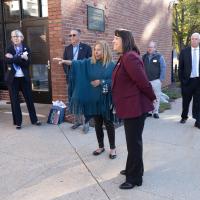
Westfield State Modernizes General Education with New Vision

Westfield State University has recently transformed its general education curriculum for the first time since 1996, guided by the Special Committee On Reforming General Education (SCORE).
For the first time since 1996, Westfield State University has undertaken a significant revision of its general education curriculum. The overhaul, led by the Special Committee On Reforming General Education (SCORE), aims to modernize and innovate the curriculum, moving beyond the traditional structure of a siloed curriculum, where disciplines like math, history, and English are taught without overlap.
This recent transformation includes a strong emphasis on diversity and equity and requires students to earn 41 credits across 13 areas of study that fall under the curriculum’s four Broad Learning Goals: Westfield State Journey; Analysis, Practice, and Inquiry; Exploring Complex Issues; and Perspectives.
Established on February 5, 2021, SCORE has spearheaded the reform efforts. “This is honestly something I’m so proud of,” said Dr. Lynn Shelley, Professor of Psychology. “It is so unique and cutting-edge, and is also exciting because our students will tackle real-life and complex problems that often have no right or wrong answer much earlier on.”
The overhaul, designed to highlight the University’s dedication to integrative learning and experience, traces its roots back to Horace Mann’s original vision for Westfield State. As the general education curriculum provides foundational learning for each of the University’s students, it was imperative to transform outdated structures and content in order to better reflect modern needs.
Dr. Megan Kennedy, Director of Educator Preparation, Accreditation, and Outreach, emphasized the importance of being mindful of assessment and accessibility in the new curriculum. “We were rightly primed for it to work this time,” she said. “There were conversations going on, and we already knew from previous attempts that the old curriculum was not assessable because of the way the learning outcomes were written. Lynn and I stepped in to help make this happen.”
Despite numerous changes since SCORE’s inception, the committee has seen remarkable success. “SCORE is succeeding in a marvelous, incredible way, and that really speaks to the fact that it was a well-formed committee,” Dr. Shelley added. “We have amazing faculty helping with this that collaborated with staff from various offices… those who have supported and assisted our students every step of the way.”
The pandemic played a role in reshaping general education by altering student interactions with academic classes, faculty, and each other. Community has emerged as a need in academic institutions, Dr. Kennedy commented, and while SCORE was building momentum, it was pivotal for all of those involved to lean on community engagement. For Dr. Kennedy, she praised the University’s faculty for being highly motivated and involved with reform efforts, which have helped transform general education in applied and meaningful ways.
“We want this curriculum to feel like Westfield State’s curriculum,” she said. “This had to represent the University, and so SCORE members have visited departments three times now, and we’re getting all of these key voices on the courses that have been built. The faculty were really ready for this and have embraced the reclaiming of Westfield State as a teaching institution. We have amazing faculty here, and my favorite conversations were about the ideas and passion people have always had, while now finding space to bring them forward.”
Much of the reform was possible due to SCORE’s transparent approach with their vision, since faculty and community engagement was implemented throughout the process. “There were surveys, department meetings, and discussions with different divisions,” Dr. Kennedy emphasized. “We met with many people, ensuring real transparency.”
“We needed to learn, and we needed to listen,” Dr. Shelley added. “Megan came from faculty, and I’m still a faculty member. Beverly Army Williams, the current executive director of general education, was a part-time faculty member. It’s important for us to listen to their concerns.”
Dr. Shelley also discussed SCORE’s relationship with proper governance, essential for curriculum success. “The only way you can get any curriculum done is through governance. We had a strong relationship with them, which has been crucial. This trusting relationship with faculty translates to governance, and we took their feedback and made changes.”
And despite the success of the reformation, she underscored the University’s dedication to improving the curriculum as the need arises, since Westfield State has always been seen as a bastion of innovation. “Nothing we produce is ever a final product,” Dr. Shelley assured. “We are constantly revising and improving things.”


